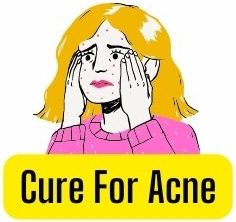Acne, a persistent and often distressing skin condition, has long been the bane of many an individual’s existence. Like a lock with an elusive key, the underlying causes of acne have remained shrouded in mystery for centuries.
However, recent scientific research appears to have shed light on one surprising connection: sugar consumption may be linked to the onset and severity of acne.
This article will delve into the complex relationship between sugar and acne, examining its origins as well as potential solutions for clearer skin.
By understanding this connection and making informed dietary choices, individuals who suffer from acne may find themselves unshackling from its oppressive grip and taking strides towards healthier skin.
The following sections will explore the science behind sugar and acne, discuss the glycemic index in relation to breakouts, provide tips for reducing sugar intake for better skin health, and consider other factors that contribute to preventing acne.
Key Takeaways
– Sugar consumption can contribute to acne development by increasing insulin levels and causing inflammation and overproduction of sebum.
– Low glycemic load diets can significantly improve acne symptoms by reducing systemic inflammation and enhancing overall skin health.
– Lifestyle modifications such as proper skincare, stress management, and adequate sleep play a crucial role in acne prevention and overall skin health.
– Addressing multiple contributing factors holistically, including sugar reduction and quality sleep, is important for acne prevention and general health improvements.
Understanding Acne and Its Causes
Acne, a prevalent skin condition, arises from a complex interplay of factors including hormonal fluctuations, excess sebum production, and inflammation, which may be exacerbated by dietary influences such as sugar intake.
Hormonal triggers like androgens and insulin-like growth factor 1 (IGF-1) stimulate sebaceous glands to produce more sebum – an oily substance that can clog pores and provide a breeding ground for acne-causing bacteria.
External factors such as stress consequences further amplify the risk of developing acne due to their impact on hormone levels and immune system function.
Research has increasingly indicated that diet plays a significant role in the development of acne, with high glycemic index foods being particularly implicated in exacerbating this skin condition.
Consuming large amounts of sugar causes rapid spikes in blood glucose levels, prompting the body to release insulin; this hormone not only regulates glucose uptake but also stimulates IGF-1 production.
Consequently, increased insulin levels lead to over stimulation of oil glands resulting in more sebum production – thus providing favorable conditions for acne formation.
An evidence-based approach towards understanding and managing acne emphasizes the importance of considering both internal factors like hormonal triggers as well as external influences such as diet and stress consequences when formulating effective treatment strategies.
The Science Behind Sugar and Acne
Delving beneath the surface of this bittersweet relationship, the science behind how sugar consumption can exacerbate acne reveals a complex interplay of hormones, inflammation, and insulin resistance.
When an individual consumes high amounts of sugar, it leads to a rapid increase in blood glucose levels, which in turn causes the body to release insulin.
This hormone is responsible for regulating glucose uptake into cells and maintaining blood sugar balance; however, elevated insulin levels also stimulate the production of sebum (oil) by sebaceous glands and promote the synthesis of androgens – male hormones that are present in both males and females.
These hormonal effects contribute significantly to the development of acne as they cause skin cells to proliferate excessively while increasing oil production.
The link between sugar inflammation and acne further reinforces this connection. High-sugar diets trigger an inflammatory response within the body due to the formation of advanced glycation end products (AGEs), which are compounds that result from interactions between sugars and proteins or lipids.
AGEs not only exacerbate existing inflammation but also generate oxidative stress – a process that damages cellular components such as DNA, proteins, and lipids – thereby impairing skin barrier function and promoting acne development.
Additionally, studies have shown that diets with low glycemic loads can significantly improve acne symptoms by reducing systemic inflammation while enhancing overall skin health.
In conclusion, understanding these intricate connections underscores the importance of dietary choices when seeking solutions for clearer skin and emphasizes the role lifestyle changes play in achieving long-term freedom from breakouts.
The Glycemic Index and Its Relation to Acne
Understanding the glycemic index and its implications on acne development is crucial for individuals seeking to manage their skin health through dietary choices. The glycemic index (GI) is a ranking system that measures how quickly a carbohydrate-containing food raises blood sugar levels, with high GI foods causing a rapid increase in blood sugar and low GI foods resulting in a slower, more gradual rise.
Research has shown that diets with a high glycemic load can exacerbate acne by increasing insulin levels, leading to inflammation and the overproduction of sebum (oil), both of which contribute to the formation of pimples.
There are several key factors to consider when aiming for an acne-friendly diet based on the glycemic index:
- 1. Choose low-GI carbohydrates: Opt for whole grains, legumes, fruits, and vegetables as they have lower GI values compared to processed or refined carbohydrates such as white bread, pastries, and sugary snacks.
- 2. Combine high-GI foods with lower-GI options: By pairing high-GI foods with sources of protein or healthy fats (e.g., avocado), one can help slow down the absorption of sugars into the bloodstream.
- 3. Consume smaller meals throughout the day: Eating smaller portions more frequently can help maintain stable blood sugar levels and prevent insulin spikes associated with large meals.
- 4. Be mindful of added sugars: Read labels carefully and avoid products containing excessive amounts of added sugars as they can significantly contribute to overall glycemic load.
Dispelling common misconceptions about ‘glycemic myths’ while adhering to these guidelines will empower individuals seeking freedom from acne breakouts through improved dietary choices.
It is essential to remember that everyone’s body may respond differently; thus, monitoring one’s skin condition after implementing changes in diet is critical for optimal results.
Ultimately, understanding the relationship between the glycemic index and acne development paves the way toward healthier food choices that promote clear skin and overall well-being.
Tips for Reducing Sugar Intake for Clearer Skin
Implementing strategies to reduce sugar intake can significantly contribute to clearer skin and improved overall health, as excessive sugar consumption has been linked to multiple adverse effects, including acne development.
One effective approach is substituting high-sugar foods with healthier sugar alternatives, such as fruits, which not only provide natural sweetness but also contain essential nutrients and antioxidants beneficial for the skin.
Incorporating whole grains instead of refined carbohydrates in one’s diet can help maintain steady blood sugar levels and reduce the risk of acne flare-ups.
Additionally, beverages like water, herbal tea, or unsweetened coffee can replace sugary drinks such as sodas and energy drinks that are known contributors to high glycemic load.
Another essential tactic is practicing mindful snacking by opting for nutrient-dense options that have a low glycemic index.
Foods rich in fiber, healthy fats, and lean protein can be advantageous for both satiety and skin health.
Examples include nuts (e.g., almonds), seeds (e.g., chia or sunflower seeds), yogurt with fresh fruit, or even hummus with vegetable sticks.
Moreover, planning meals ahead of time allows individuals to make informed decisions about their food choices while ensuring a balanced nutritional profile in their daily diet.
Ultimately, reducing sugar intake should be combined with other lifestyle modifications such as stress reduction techniques and regular physical activity to optimize skincare results and promote overall well being.
Other Factors to Consider for Acne Prevention
In addition to dietary modifications, several other factors play a crucial role in acne prevention and overall skin health, such as proper skincare routines, stress management, and adequate sleep. Addressing these factors holistically can lead to improved skin health and reduced acne breakouts.
Implementing an appropriate skincare routine that caters to individual needs is essential for maintaining clear and healthy skin. Utilizing gentle cleansers and non-comedogenic skincare products can prevent clogged pores while keeping the skin clean and moisturized.
Additionally, managing stress levels through various techniques can help regulate hormonal imbalances that may contribute to acne formation. Techniques such as yoga, meditation, or engaging in hobbies can aid in reducing stress levels which play a significant role in achieving hormonal balance.
Lastly, ensuring sufficient sleep allows the body to regenerate and repair itself, promoting overall well-being. Ensuring at least 7-8 hours of quality sleep each night promotes cell regeneration and helps maintain optimal hormone levels.
Implementing these strategies alongside sugar reduction not only contributes to clearer skin but also fosters general health improvements.
Taking a comprehensive approach towards acne prevention by addressing multiple contributing factors demonstrates a commitment towards personal well-being while providing individuals with greater freedom from persistent acne breakouts.
Frequently Asked Questions
How does hormonal imbalance contribute to the development of acne, and does sugar play a role in this?
Research has shown that hormonal imbalance plays a significant role in the development of acne, with hormone regulation being essential for maintaining healthy skin.
In particular, an excess of androgens (male hormones) can stimulate sebaceous glands to produce more oil, leading to clogged pores and the formation of acne lesions.
The consumption of sugar has been linked to this process as it may contribute to insulin resistance, which in turn can cause a rise in insulin-like growth factor 1 (IGF-1) levels.
Elevated IGF-1 levels have been associated with increased sebum production and inflammation – two major factors in the appearance of acne.
Engaging in a sugar detox can potentially aid in reducing these negative effects on the skin by improving insulin sensitivity and supporting hormone regulation.
This approach may provide individuals with an enhanced sense of freedom from the constraints imposed by acne on their daily lives while promoting overall well-being through balanced nutrition.
Are there any specific types of sugar (e.g., fructose, glucose, etc.) that are more likely to cause acne than others?
Investigating the distinct roles of various sugar types in acne development, it is essential to consider the fructose effects and glucose impact on hormonal balance and inflammation.
Recent studies suggest that high-glycemic foods, which include sugars like glucose, may exacerbate acne by causing rapid spikes in blood sugar levels. These fluctuations can lead to increased insulin production and subsequent hormonal imbalances which contribute to acne development.
On the other hand, fructose, a lower glycemic index sugar commonly found in fruits, has been reported to have a lesser effect on blood sugar levels; however, excessive intake may still affect insulin sensitivity and trigger hormone-related skin issues.
Therefore, while both types of sugars have the potential to contribute to acne formation depending on individual factors and consumption levels, it appears that glucose might pose a relatively higher risk due to its more significant impact on blood sugar levels and hormones regulation.
Can sugar substitutes or artificial sweeteners also lead to acne, or are they a safer option for those prone to breakouts?
The impact of sugar substitutes on acne remains a subject of ongoing investigation, with existing research yielding mixed results. While artificial sweeteners may provide an alternative for individuals seeking to reduce sugar consumption and its potential effects on acne, some studies have suggested that these sweeteners could still contribute to breakouts in certain cases.
For instance, insulin resistance has been linked to both acne development and the consumption of large amounts of non-nutritive sweeteners. Additionally, some sugar substitutes may cause inflammation or alter gut microbiota composition, which are factors known to influence skin health.
Therefore, further research is necessary to conclusively determine whether artificial sweeteners are a safer option for those prone to acne or if alternative strategies should be considered for managing breakouts effectively.
How does the consumption of dairy products, which contain natural sugars, affect acne development, and should they be reduced for clearer skin?
The proof is in the pudding when it comes to dairy products and their potential impact on acne development. Lactose, a natural sugar found in dairy products, has been widely debated as a possible contributing factor to acne formation.
Recent studies have suggested that components within dairy, such as hormones and proteins like casein and whey, may exacerbate inflammation and increase sebum production – two factors that can lead to breakouts.
Consequently, individuals seeking clearer skin may find it beneficial to explore dairy alternatives like almond milk or soy yogurt while also maintaining consistent skincare routines involving gentle cleansing and regular exfoliation.
In essence, reducing dairy consumption not only promotes healthier dietary habits but also paves the way for achieving an unblemished complexion reminiscent of one’s innate desire for freedom from imperfections.
Are there any supplements or vitamins that can help counteract the effects of sugar on acne-prone skin?
In the quest for achieving acne-free skin, research has shown that certain supplements and vitamins may play a significant role in counteracting the effects of sugar on acne-prone individuals.
Acne fighting foods, rich in nutrients such as omega-3 fatty acids, zinc, antioxidants and vitamins A, D, and E have been demonstrated to benefit skin health by reducing inflammation, promoting cell regeneration and aiding in stress reduction.
For instance, omega-3 fatty acids found in fish oil are known for their anti-inflammatory properties while zinc has been shown to reduce sebum production; both factors contributing to improved skin health.
Furthermore, antioxidants like vitamin C can help neutralize free radicals caused by oxidative stress which is linked to acne development.
To maximize the potential benefits of these nutrients for clearer skin, it is essential that they be incorporated into a balanced diet alongside regular exercise and stress management techniques.
Conclusion 💭
In conclusion, the correlation between sugar consumption and acne prevalence is an area that warrants further investigation.
Evidence suggests that a high glycemic diet may exacerbate acne symptoms, highlighting the need for individuals to be mindful of their sugar intake.
To gain a more comprehensive understanding of acne prevention, it is crucial to explore other factors such as genetics, hormones, and skincare routines.
Future research endeavors will undoubtedly contribute to elucidating effective strategies for achieving clear skin.





